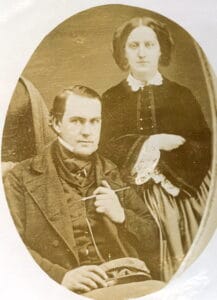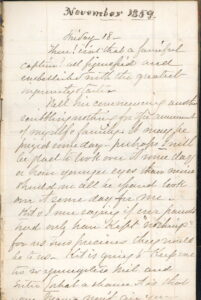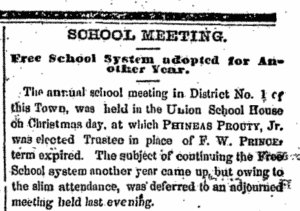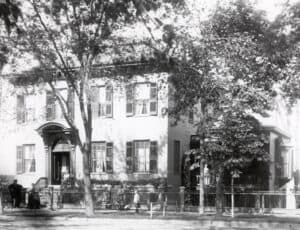Phin and Kit: The Prouty Family Legacy Part II
Sometime in the 1850s, the son and namesake of Phineas Prouty, Sr. took over the hardware business on Seneca Street. We have a deeper picture of Phineas Prouty Jr.’s life because he and his wife Adelaide wrote detailed diaries for several years early in their marriage. His diary covers part of 1858 and 1859 and we have Adelaide’s for most of 1856 to 1862.1
Phineas was in his early thirties and had been married three years during the time he was writing. He and Adelaide, whom he called Kit, had their first two of six children, Milly (born 1856) and Allie (born 1858). The diaries are a revealing peek into the lives of a well-to-do 19th-century American family early in their married life.
As we learned in our previous post, Phineas Prouty, Jr. was the youngest of four children, though his older brother died before he was born. His mother died when he was just three years old, and his father never remarried. His sisters married Alexander Chew and Thomas Hillhouse and lived in Geneva. Phineas married Adelaide Cobleigh in 1855, and they lived with his father at 543 South Main Street. According to his obituary, Phineas Jr. was trained in law and was admitted to the bar, but never pursued legal work. He went to work for his father, along with Alexander Chew. Based on the writings in his diary, he did not enjoy the hardware business and frequently wrote that he found the work confining. Unlike John Johnston or Robert Swan, Phineas detested attending the trials of new mowing machines. He was relieved when Alex Chew, rather than him, traveled to New York to purchase new stock for the store. Phineas preferred fishing, drawing, celestial observations, and spending time with his family to work. In contradiction with our gender stereotypes, Phineas often wrote of taking care of his daughters, even changing diapers.
By 1858, he apparently planned or hoped to sell part of the business:
“Tried to get some advice from father about selling out–but in vain. He surely cannot expect us to spend the best part of our lives tied down to a business that yields us but little more than a living. Don’t think he does right.”
The efforts to sell continued over the next couple of years, not bearing fruit for a decade.
His father may not have approved of his son’s enjoyment of leisure activities, as Phin wrote:
“Father, Kit & I went trolling for bass & with fine sport.… Father was very much excited when he reeled in the bass & evidently had not so contemptuous an opinion of a rod & reel after the sport.”
Phineas Prouty, Jr. also served the community, but his diary indicates that this was a duty he undertook without enthusiasm. He wrote of being “unavoidably” elected Foreman of Fire Company No. 5 for a second time. He was also a school trustee and regularly went to the district schools to hear examinations. He was a founding member of the Town of Seneca County Republican Party in 1856, but was decidedly not an abolitionist. Later in life he was also on the Geneva Cemetery Commission that established Glenwood Cemetery.
While the bane of Phineas Jr.’s existence was the hardware store, Adelaide’s cross to bear was housework and servants. She wrote frequently about hiring, firing, and losing cooks, nursemaids and other servants.
“Housekeeping is a perfect chromatic scale–all harmony is lost in the incessant jingle of flats and sharps. Today heard a discord in the kitchen–found out the false musician and drummed her out of the orchestra. So I’m ‘director’ pro tem.”
She complained when she was stuck with the arduous labor of cooking dinner and cleaning whenever she was without a servant or when one was ill. Like so many women of her class, she expected loyalty from the women she hired but mistrusted them:
Feel dejected & utterly cast down tonight, thinking over the worry & trial of housekeeping with such servants as we has [sic] nowadays. Their treachery and untruthfulness. Such prying makes me suspicious & unjust. The idea of one’s life being spent in setting traps to detect the loss of a pound or a particle! Traps in the potatoe-bin [sic]! Traps in the pork-barrel! Flour, corn & bean traps! And to find yourself trapped in the bargain.
And
The cook difficulty settled. Catherine has consented or rather concluded to stay. What a weariness and annoyance servants are. They are so ignorant one cannot reason with them & so mercenary they are not activated by any other motives than purely selfish ones.
The Prouty family, like most at the time, was fairly religious, and Adelaide and Phineas frequently wrote about attending church services or about their prayers for themselves and their children. Perhaps because of his mother’s Dutch ancestry, they periodically attended the Dutch Reformed Church, but also went to Trinity Episcopal Church. In 1858 Phineas decided on the Episcopal denomination, paying for a pew at Trinity.
“Rented pew in the Episcopal Church. Sorry to leave the old Dutch Church but do not like the way things are conducted there. They too have commenced the system of excitements & revivals which to me seem wrong. But churches are much less to be thought of than the heart. Our good Father looks to it & the impulses rather than the church or form.”
Both parents worried about their children being good, a common concern among mid-19th-century Americans. Phineas wrote:
“How very very important it is that the lesson always to be good, always to act good & right because it is the way to be should be instilled into a child’s mind branded with enduring letters on a child’s heart so that it never so far forget it as to do anything which it may here after regret.”
And Adelaide:
“Dear little children–Our father grant that they may lead pure & good lives and at the, end come to ‘the haven when they would be.’”
Religion was a consolation when things were difficult, and both parents were keenly aware of the losses they might face in a period when death could come swiftly and without notice. Both diaries are full of accounts of their own illnesses and those of their children. They recount numerous colds, fevers, boils, blisters, worms, headaches, eye trouble, chickenpox, bilious fevers, toothaches and extractions, and digestive disorders. Phineas survived a case of diphtheria in 1860, a disease which killed their 7-year-old niece Annie Hillhouse that year and several members of other families they knew. Milly nearly died of a malarial fever in the same year, a friend died of typhoid in California, and several children they knew died following long illnesses. At Annie’s death, Adelaide wrote
“This morning dear little Annie died. Easily, without the least suffering and only a few moments before she ceased breathing, said “Mama”. Dear Harriet has been the first in our family that has been afflicted. Oh how bitterly she wept and how sharp the agony she felt. I pray it may lead us all nearer to the house where she is an angel now nearer to Him who sends the trial.”
Four-year-old Milly fell ill just a month after Annie died, giving Adelaide and Phineas their first taste of the terror of losing a child.
“…oh how sick dear little Milly has been–& how dark the days & nights were. Wednesday was the most terrible–for it seemed that her little life hung by a thread & the least thing would sever it. Dear Phin how pale and agonized he looked & how hard it was for me to bow in submission to the trial. But God be thanked it is over–she is better tho’ very weak & feeble and quite herself.”
It was months before Milly was back to her normal self. She, like many others, may have suffered lifelong after effects of the illness.
Life for the Proutys was not all pain, frustration, and grief. They clearly were more fortunate than most people in Geneva at the time. They had time and money to take carriage rides, go boating and picnicking, attend concerts and lectures, and even traveled to New England and New York on a vacation. They celebrated Christmas and bought their children presents. Mrs. Prouty’s father was a dancing master and she played piano and enjoyed music and dancing. Like many young parents, they wondered at their children’s growth and development, noting their progress in walking, talking and behavior, and worrying about their futures.
These diaries give an intimate glimpse into one family’s life and love in early marriage, but where did they end up? Find out in the next installment or attend our History Sandwiched In program on November 6, 2021 for a sneak preview.
Footnotes
[1] Adelaide recorded her life for many more years, though we only have diaries from 1856 to 1862 and 1885 to 1890.
Phineas Prouty, Sr. and His Family Legacy, Part I
The Next Generation: The Prouty Family Legacy Part III




